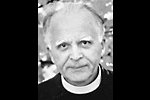
A theologian and moralist as well as one of the world’s most distinguished historians and philosophers of science, Stanley Jaki is the author of more than forty highly esteemed (but also controversial) books and dozens of essays, reviews, book introductions, and encyclopedia articles.
Born in Hungary in 1924, Jaki was educated at an ancient and famous Benedictine abbey and became a monk and priest. He continued his studies in Rome, taking a doctorate in theology in 1950. Resident in the United States since 1950, Jaki taught college theology and French before severe health problems required him to retire from teaching. Jaki turned this apparent defeat in his career to good advantage when he decided to pursue a doctorate in physics, which he completed under the Austrian émigré and Nobel laureate Victor F. Hess at Fordham University in 1957. This was the beginning of a second career that has led to many books and articles and the highest intellectual honors available, including the Lecomte du Nouy Prize from Rockefeller University in 1970, the Templeton Prize in 1987, two series of Gifford Lectureships at the University of Edinburgh, two series of lectureships in Oxford, and many other lectureships and honors in the United States, Britain, France, Germany, Italy, and Hungary.
Jaki’s first major scientific book was the groundbreaking The Relevance of Physics, published by the University of Chicago Press in 1966. In this and his vast body of subsequent writing Jaki became influential and controversial for arguing and documenting a new narrative of the history of Western science that conceived of it in ways deeply unsettling to the consensus view that had been inspired and developed initially by Bacon, Descartes, and their admiring successors, the eighteenth-century French “Encyclopedists” and British utilitarians. Briefly put, Jaki’s argument is that three biases have afflicted the development of science and especially the explanation of its successes: empiricism, idealism, and anticlericalism. Unearthing and promoting the groundbreaking studies of the French Catholic physicist and science historian Pierre Duhem (1861–1916), on whom he wrote an important biography, Jaki argued for the importance of medieval religion and science as preparing the way for the breakthroughs in physics and astronomy of Copernicus, Kepler, Galileo, and Newton. Neither ancient nor Baconian empiricism nor ancient or modern idealism could find the “middle road” of metaphysical realism that fostered the breakthrough of science in the seventeenth century, supremely exemplified in Newton.
In addition to his critique of empiricisms and idealisms ancient and modern, Jaki has argued that the history of science has repeatedly been used unfairly and inaccurately as an anti-Christian ideological tool, especially by a long line of French anticlerical propagandists, from the “Encyclopedists” to George Sarton and Alexander Koyre. No short summary can do justice to the insight, detail, and philosophical power and importance of Jaki’s body of work on these issues and the relations between science, philosophy, ethics, religion, and culture. Though foreshadowed by Duhem’s immense work and Whitehead’s short Science and the Modern World (1925), Jaki’s oeuvre has an astonishingly learned and original power and relevance that have as yet been inadequately recognized.
Further Reading:
Jaki, Stanley L. A Mind’s Matter: An Intellectual Autobiography. Grand Rapids, Mich.: W. B. Eerdmans, 2002.
———. Means to Message: A Treatise on Truth. Grand Rapids, Mich.: W. B. Eerdmans, 1999.
———. The Road of Science and the Ways to God. Chicago: University of Chicago Press, 1978.
Reprinted from American Conservatism: An Encyclopedia (ISI Books).